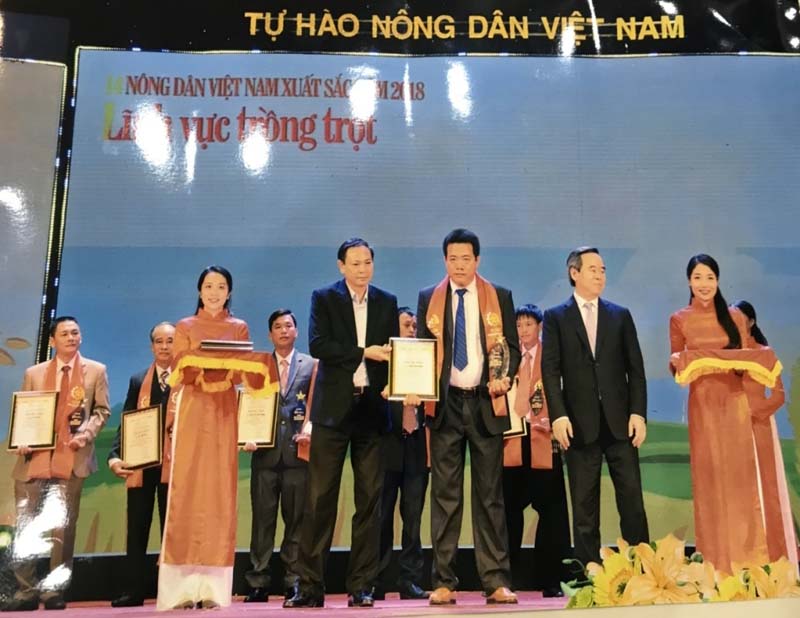
(HBO) - Mr. Tran Van Minh living in Diem Tong hamlet, Lien Son commune, Luong Son district has boldly developed the economy, to eradicate hunger and reduce the poverty. For 5 consecutive years, he has been recognized as an excellent farmer in producing and doing the business at National level; in October, 2018, the Association of Vietnam Farmers Association in cooperation with the Department of Propaganda and Education honored him as one of the 63 " the outstanding Vietnamese farmers" in 2018.

Mr. Tran Van Minh was awarded the title of
"Excellent Vietnamese Farmer" in 2018.
Mr. Tran Van Minh started his farming and
breeding career in 2004.
To exploit the potential and strengths of the
locality, he decided to expand the area and scale of production gradually every
year. Currently, his family has accumulated 45 hectares of land, over 40
hectares of which is the forestry land for planting acacia and eucalyptus
trees. To improve the efficiency, he combined cattle grazing with the total
herd ranging from 45 to 60 animals. At present, there are 36 cows and 18
buffaloes, including 15 mother cows, 8 mother buffaloes in good health for
breeding. Every year, he exploits to sell partially from 8 to 10 hectares of
commercial acacia and exports 15-20 cows, earning the interest from 400-450
million dongs.
Mr. Minh also planted 4,5 hectares of
planting galangal, lemongrass in the lower foothills, for a stable harvest of
45 - 50 tons, excluding the expenses, this brings to him about 600 million VND
per year. In the garden near his house, he planted 1 hectare of Dien grapefruit
for the shade and high economic efficiency, which he can collect the profit of
150 million VND each year. On average every year, his family earns 1.2 billion
dong of interest from the cultivation and husbandry model.
Not satisfied with only farming and
husbandry, in 2010, he continued to invest in business services transportation,
construction machinery. His family currently has a pickup truck, 3 excavators,
bulldozers to serve the work of the family, and meet the needs of production
machinery for local people in the region. Each year, his family earns 4.5
billion VND, after excluding expenses, the profit reached 3 billion VND. With
this economic model, his family has created regular jobs for 5 - 7 laborers,
sometimes attracting 30 seasonal workers in the locality.
Dao Village’s honey – a product certified with a 3-star OCOP (One Commune One Product) rating by Thong Nhat Agricultural Cooperative in Dao Village (Hoa Binh City) – is highly regarded by consumers for its quality, richness, and variety in packaging. The distinctively sweet taste of Dao Village’s honey leaves a lasting impression on anyone who has tried it.
In alignment with Project No. 07-DA/TU, issued by the Hoa Binh provincial Party Committee on November 1, 2021, Lac Thuy district has actively promoted investment and supported the sustainable development of its industrial and handicraft sectors during the 2021–2025 period. Alongside this, the district has remained committed to preserving and revitalising traditional craft villages.
Located in the northern part of Lac Thuy district, with a temperate climate and fertile soil, Phu Thanh commune has great potential and advantages in growing tea. The long-standing experience, combined with strict adherence to organic farming practices in the tea gardens, ensures that the dried tea products from Phu Thanh and Lac Thuy as a whole are sold out immediately upon production, providing a stable and prosperous life for the local people.
Amid efforts to streamline the administrative apparatus, Hoa Binh province has intensified measures to address challenges in land clearance, resettlement support, and infrastructure investment, aiming to speed up the progress of key projects.
Hoa Binh province has posted an unprecedented economic growth rate of 12.76% in the first quarter of 2025, marking its highest quarterly performance to date and positioning it as the second fastest-growing locality in the country, trailing only Bac Giang province.
Under current regulations, products in the One Commune – One Product (OCOP) programme that are rated three stars or higher must undergo re-evaluation every three months. However, in reality, some of these products fail to consistently meet the required standards, raising concerns about the sustainability of their OCOP certification. This underscores the urgent need for producers to enhance product quality and gradually develop their OCOP products into strong, marketable brands.



